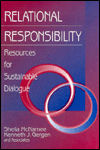
By Sheila McNamee and Kenneth J.
Gergen (and Associates)
Sage, 1999
Reviewer: Joy
L. Hart
University of Louisville
Based in social constructionism, McNamee and Gergen seek to replace the individual as the central focus of blame, instead pinning responsibility and causality on relationships and relational processes. Although a logic of individual responsibility is heavily ingrained in Western cultures, the authors point out its weaknesses and potential negative outcomes (e.g., isolation, alienation) and call for a new method of understanding - relational responsibility.
The book, designed to provide "resources for sustainable dialogue," is structured in three parts. First, McNamee and Gergen discuss relational responsibility. Second, several authors, many associated with the Taos Institute, provide commentary and elaboration. Third, McNamee and Gergen integrate the comments from part two, expand their original position, and explore future possibilities for relational responsibility.
In part one, McNamee and Gergen seek to reach three goals: elaborate a background, explain a position, and provide a case example. With the Preface and Chapter 1, they situate their position in constructionist thought. Asserting that the stronghold of individual responsibility thwarts our understanding of relationships, the authors call for "valuing, sustaining, and creating forms of relationship out of which common meanings - and thus moralities - can take wing" (p. xi). Rather than assigning blame or credit, this book is about "entirely different ways of engaging with others and thus of creating our worlds" (p. xii); therefore, calling for changes in the ways we relate. After exploring problems with individual responsibility, McNamee and Gergen examine four forms of "relational intelligibility," ranging from internal others to systemic processes. Chapter 2 focuses on how each of these four relational logics allows a shift to relational responsibility. Chapter 3 applies each of the four logics to a case of child abuse and examines relational levels of analysis.
Part two of the book is divided into three sections: commentaries in general agreement with the McNamee and Gergen position, those citing reservations, and ones which "springboard" in new directions. In the first of these sections, several authors discuss key examples. These include Cooperrider and Whitney's insights into a successful community change program, Anderson's discussion of collaborative learning communities, and Burkitt's focus on conditions allowing for actions (e.g., the Holocaust). While Lannamann worries about risks of separating individuals and relationships from processes creating them and the import of dominance and power, M. Gergen notes the "upside" of the current system with its associated focus on individual accomplishment (e.g., merit) and previews broad-scale changes (e.g., the legal system) in any move toward relational accountability and Roth's mediation provides questions for consideration.
In the second section of part two, two chapters, Deetz and White and Mazanec and Duck, call for greater recognition of power, a focus on inequalities, increased development of discourse, and acceptance of conflict and divergent voices. Although agreeing that we need to assess the effects we have on each other, Tomm suggests that too heavy a focus on the relational may relieve people from responsibilities they should carry, often based on choices they made. Along with other authors in this section, Riikonen sees some merit in McNamee and Gergen's approach, but sees their overall discussion as "too academic." In various ways in this section, all of the authors suggest more attention to "voice."
In the next section of part two, considerable attention is devoted to change, narrative, and voice. Cotter and Cotter and Penn and Frankfort address the possibility of change through creating new narratives. Shotter and Katz argue that change toward a relational perspective may result in the creation of a "living we" - "a much larger, collective agency" (p. 154). Eggers points out that we behave in relation to others and that a worthy goal would be change toward creating contexts conducive to joint goals. Finally, Marzari posits that addressing multiple voices will clarify positions and further thought.
In the third section of the book, McNamee and Gergen respond to the commentaries and flesh out their position. In particular, their discussion of the ways in which the responses in section two augmented their original thoughts is interesting and useful. For example, here they acknowledge the need to address differences in power and opportunities and an interest in proactive relational responsibility. Ultimately, they conclude that rather than an alternative to individual responsibility, relational responsibility should be seen as a way of life.
This book is a worthwhile read - it addresses an interesting position and does so creatively. Their attempt to provide a novel structure, departing from standard academic tradition, is laudable, and the results are, in many ways, inviting. However, the approach leads to less integrated chapters and to some extent the overall product is disjointed. Some readers will delight in the variety of perspectives included; others will yearn for more structure. And although interesting to consider, their perspect ive remains a highly abstract one, despite their claims that this book is "devoted to practice" (p. xi).